How Do Herbicides Kill Weeds But Not Grass?
by Lee Safin
Herbicides are known as an effective solution to control the growth of undesired plants like weeds. This chemical agent is also called a weed killer. Apart from killing weeds, they can also kill other plants. However, you don’t want to make them exposed to your desired plants that you want to protect.
But, how do herbicides kill weeds but not grass?
Selective herbicides work effectively to kill weeds but not grass. Plus, weeds are a special type of broad-leaved plants and other grass plants. They also have a unique enzyme too.
Herbicides only work on this type of enzyme plant. They will attack weeds and kill them gradually. Let’s go for an in-depth discussion about “how do herbicides kill weeds but not grass?”
Contents

How Do Herbicides Work?
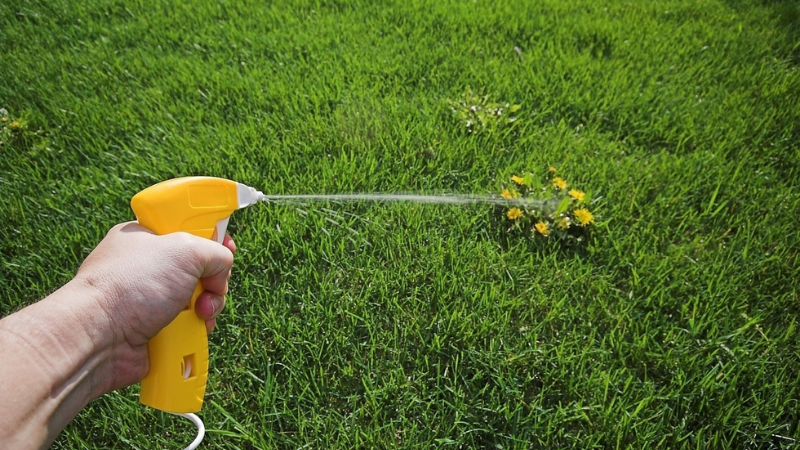
Before knowing how do herbicides kill weeds but not grass, let’s check out how do herbicides work.
The working mechanism of herbicide is various. If you want to get a reliable result from herbicides, you want first to apply them to plants.
After applying them, make sure they remain on the plant leaves and let them absorb the solution. It is because the solution needs to stay on the plant’s leaves for a minimum amount of time.
When it stays for several hours, it will enter into plant cells. Gradually, it will pass through water-filled cells from the out of the cells.
Then, it will reach the core part of plant leaves known as enzymes and target it. Making them weaker and die is all thing left to do.
How Do Herbicides Kill Weeds But Not Grass?
Herbicides come in various types: pre-emergence herbicides, non-selective herbicides, and selective herbicides. Using any random herbicide to kill your particular grass is a good idea.
Pre-emergence herbicides are mainly to control the growth of herbicides but not to kill anything. Farmers and gardeners use them before planting plants. So, their suitability may not be compatible with your weeds.
Non-selective herbicides are a powerful solution because they can kill any plants they come close to. They will destroy not only weeds but also grass. That’s why using them is risky.
The only option you have is using selective herbicides. They will treat your desired plants while keeping other plants safe.
Due to their special formula, they only work on particular enzyme plants, which have broad-leave.
1. Synthetic Growth Regulator


There are several types of selective herbicides, which work effectively for broad-leaf weeds. One of them is synthetic growth regulator, which has synthetic compounds such as Cycocel, IBA, etc.
By using this growth regulator, you can stop the circulation system of weeds and ultimately kill broad-leaf weeds. However, they may harm other plants too, if you don’t become cautious. They spread rapidly. But most of the time, they will not harm the grass if you use the solution carefully.
2. Protein Synthesis Inhibitor


Protein synthesis inhibitor is one of the most popular groups of herbicides, which have been used for more than six decades. It is a special type of herbicide that blocks or reduces cells’ development by disturbing the procedure.
Proteins are mainly used to control all metabolic procedures. However, each plant has its own way of producing energy. That’s why it is challenging to handle all types of weeds by using this group of herbicides.
Nevertheless, research showed they effectively kill many hard weeds, which you may kill using some other herbicides.
How Do You Get Rid Of Weeds So They Never Come Back?
Getting rid of weeds permanently is all we want to make our yard beautiful. But how do you get rid of weeds so they never come back? In that case, you want to apply effective solutions so that you can destroy their existence from your lawn.
Here we are mentioning step-by-step to give you a full overview about “How do you get rid of weeds so they never come back?”
Step 1 — Identifying Grass Type

The first step is finding out the specific kind of grass your turf has. There is no guarantee a particular product will not harm your grass.
For example, if your garden has warm-season or cool-season grass, you need to choose a particular herbicide that is safe for the type of grass you have.
Most of the time, the manufacturer labels all the cautions about the product, where you will find out whether your grass will be safe or not. If you are still unsure about using the product, you can take an expert suggestion to avoid risk.
Read More – What Is The Best Grass Seed For Overseeding?
Step 2 — Identifying Weed Type
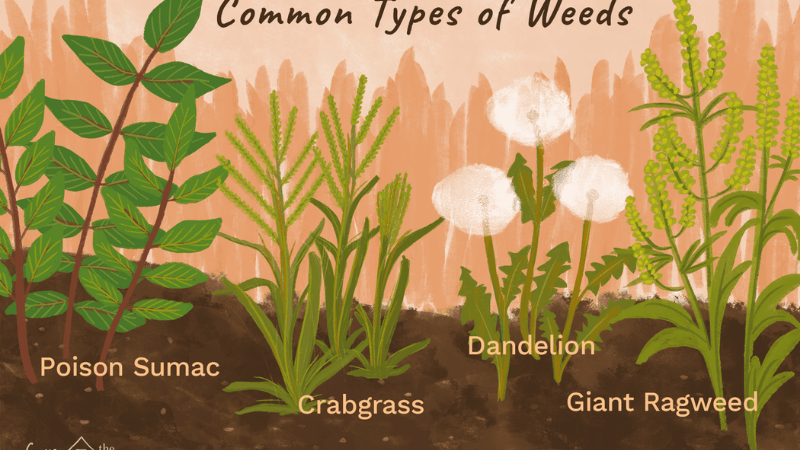
You have already identified the type of grass your garden has. Now, you also want to figure out the kind of weeds your yard has.
Weeds come in various types:
| Weeds Type | Weed Name |
|---|---|
| Grassy Weeds | Bermuda grass, barnyard grass, crabgrass, etc |
| Broad-leaf Weeds | Henbit, dandelion, clover, etc. |
| Grass-like weeds | Nutsedge, wild garlic, star of Bethlehem, etc. |
Read More – 4 Pro Therapies on How to Get Rid of Weeds Forever?
Step 3 — Controlling Sedges
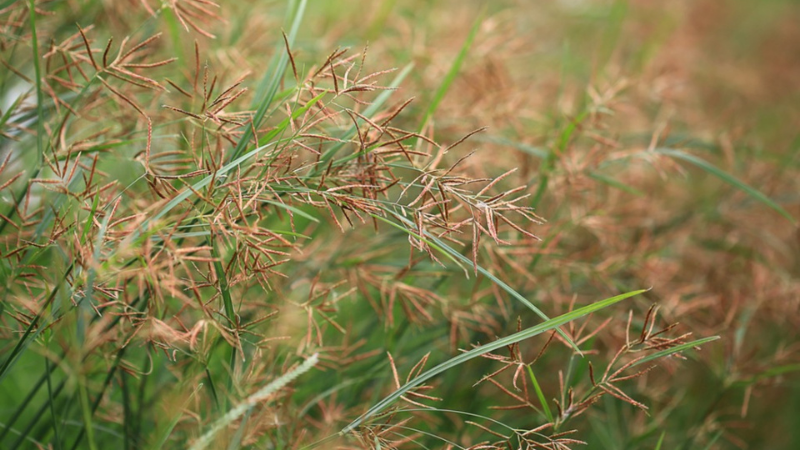
Apart from killing weeds, you need also to control sedges too. But the problem is not all products can control sedges. You will notice some products don’t have any label to control sedges.
What if your garden has all three types of weeds? We are assuming you are not garden experts. Hence, it is pretty hard to know which type of weeds your garden has.
That’s why it is best to choose an effective product that can kill all types of weeds while keeping your grass safe.
Apart from that, you have the option to choose both selective and non-selective weed killers. Choosing selective weed killers means they will only be for a particular type of weed. A rule of thumb is checking the label to learn about it. Also, they won’t harm any grass or plants that are not listed on the label.
Alternatively, you can also choose non-selective weed killers, which will kill any plants if applied one the plant. So, it is risky; you may end up using the solution on your grass and kill them. Cautiousness is important while choosing this weed killer.
Step 4 — Choosing The Perfect Time
When you use post-emergent herbicides, timing is another crucial point you want to note down. Choose a perfect time frame when all the weeds you want to kill have already become healthy and grown-up.
So, this depends on their health conditions. You are not choosing any particular season or a specific temperature to apply the weed killer.
Besides, applying them at a hot temperature won’t give you effective results. The reason is that weeds can’t thrive well in heat conditions, and they become weak the temperature is too high.
So, they won’t be super active and will fail to absorb the solution properly. Also, you will put your lawn at risk.
These are all the important steps you want to follow to kill weeds while wondering about “How do you get rid of weeds so they never come back?”
How To Control Weeds Without Killing Grass?
Nothing is more beautiful than seeing a weed-free lawn. Every gardener’s dream is to find the best way to kill weeds while keeping their attractive turn safe.
Do you think growing a healthy lawn is really hard?
No! It takes minimal effort to kill all the unwanted weeds and give your yard an enchanting greenish appearance.
1. Maintaining A Perfect Height For Turf Grass
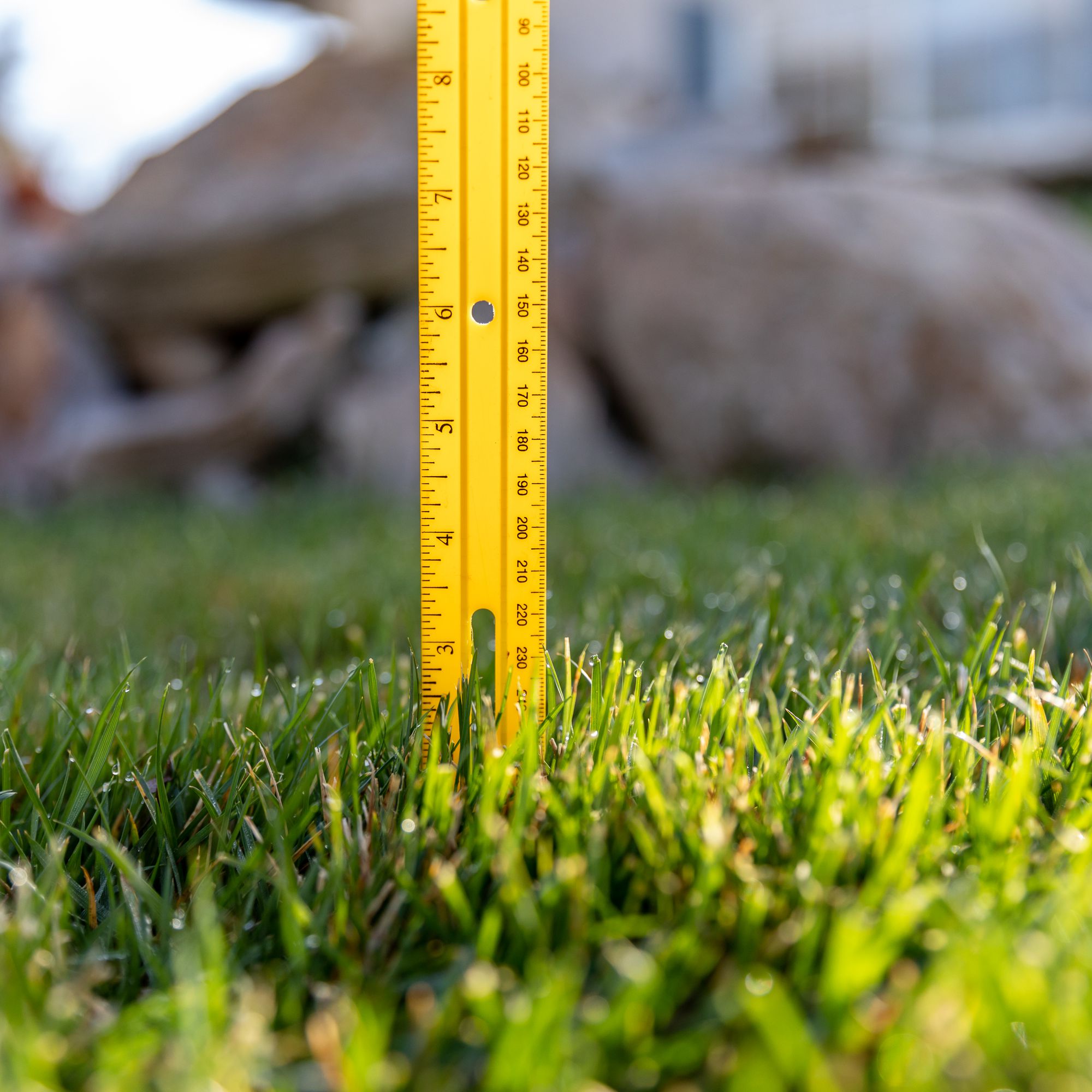
Cutting your turfgrass at the right height is an essential task every garden should take into account. If you keep them at the right height, they can surpass weeds in a competitive situation. They will receive vital nutrients from the soil. Finally, turn grass will turn into the fully grown-up lawn,
2. Choosing The Right Herbicides
Some situations will arise where you will have no options but to use herbicides. Using an effective product will help you to outcompete weeds.
Two types of herbicide products are mainly available to control weeds in your lawn.
- Liquid products
- Granular products
Liquid herbicides are super easy to apply, and they work quickly. Plus, they can control herbicides for up to 5 years.
You will spray a huge amount of liquid herbicides on the weeds and let the solution stay for 2-3 days in that conditions. You will see noticeable results after that.
On the contrary, many people use granular products for their landscape lawn gardens. A bunch of granular herbicides is available in the market, such as Bonide, Scotts Weed Control, SSI Maxim SpraKiL, etc.


However, it takes time to get reliable results from these products. You want to wait 7-10 days to let them fully destroy the weeds. In some cases, they may need up to two weeks if your garden weeds are super strong and thick.
Whatever it takes, you are not someone to compromise safety. Hence, choosing a reliable herbicide is essential to control or kill them while not harming your grass.
3. Choosing A Liquid Or Granular Product?
Which product should you choose to control or kill weeds: liquid or granular product? When choosing an herbicide, we want it to be less harsh but more effective to control or kill weeds. Let’s go through some most commonly used products and see how good they are.
Roundup Weed Killer
No products found.
No products found.
Many people often this weed killer without knowing the consequences. No doubt, it is a super-effective weed killer that can kill weeds in no time.
Additionally, Roundup is super easy to apply as it comes with a spray container. You can reach sideways, and other spots treat areas effortlessly.
But according to most experts, you should not use this product if you have turf grass. It works like an explosive bomb. So, if any grass is under the weed, it will also kill them.
Many people had to suffer for using this product as it made their lawn brown for an entire season. However, you can use it only in ornamental areas where there is not a single grass. Using in a restricted or infrequent manner is always encouraged for this product.
You want to be cautious while using this harsh weed killer if any plants are close to weeds. So, think twice before choosing this type of liquid herbicide for your garden.
IMAGE Nutsedge Weed Killer
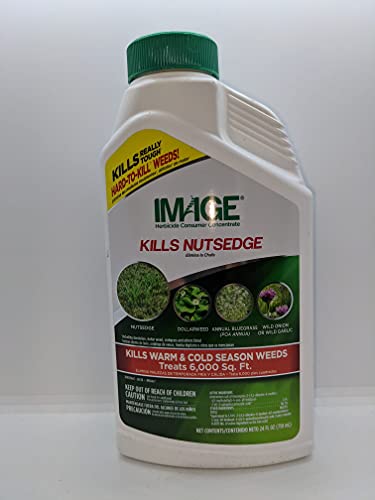

Many users are a fan of using this weed killer. It is so effective! Most users use this product only once every season.
Nutsedge or nutgrass is one kind of weed. Many gardeners got effective results to kills these weeds.
The weed killer is best to apply where weeds are seen in wet areas, or water is always passing. Additionally, you can use a spot treatment approach to kill this type of weed.
However, many users complained that the product discolored their lawn grass a little bit. As a result, slight color discoloration will occur in your grass even after applying it in a perfect ratio.
Spectracide Weed Stop
No products found.
No products found.
Here comes another high-quality weed killer; many gardeners love it. Earlier, we have reviewed about two liquid herbicides. This product is a granular herbicide.
It works as both a pre-emergent herbicide and weed killer. So, what does it means? It means it will kill all weeds that are surrounded by your lawn. Also, the grass will absorb them and ensure no formulation of new weeds in the future.
That’s what you are looking for, right? Killing two birds at a stone! However, to apply the weed killer, you want to use a broadcast spreader. We know it is a little bit involved process, but it is worth your effort.
Choosing The Best Herbicide To Apply
So, among these three options, we will pick the Spectracide Weed Stop as the best option. It is a perfect answer to this question: how do herbicides kill weeds but not grass? It is because it does less damage to your grass while killing weeds.
When should you apply this herbicide?
It is best to use the product when the grass is wet and no chance of rain after application. Hence, you will choose a sunny day through the weather forecast and apply the solution very early morning.
It is because the lawn has dew early in the morning. After applying the solution to the weeds, don’t make the mistake of watering them. Let it dry. You will see effective results within a short time.
Many people complained it didn’t work for them, but they actually didn’t follow the right method. Applying on dry grass will not work because the solution needs to stay on the broad leaves for a certain time. Only then will the procedure begin and kill weeds. According to most reviewers, it gives up to 5 months of protection for their turfgrass.
The most important thing while applying the solution is following the recommended rate. Not more or not less! Using recommended rate will give you the best result.
Since they are chemical-based products, we don’t want to use them for a lifetime. Utilizing them less makes sense. All we want is to ensure a healthy lawn to make our garden more beautiful.
Why Herbicides Kill Plants?
Apart from knowing how do herbicides kill weeds but not grass, it is also important to learn why herbicides kill plants. It is clear herbicides are the worst enemy for plants as they can kill them. When herbicides stay on plants for a reasonable amount of time, they build up a toxin substance on the plant cells.
Though it is a powerful compound, the toxicity stays at a moderate level. The toxic compound enters inside the target zone (enzyme) and develops more substances, and makes them die. This is the reason why herbicides kill plants.
The Best Way To Prevent Weeds
You have already got enough idea on how do herbicides kill weeds but not grass. After killing weeds, do you think they will never come back? Who knows when and how they will re-grow? Taking preventive actions is the best rule of thumb.
The finest rule of thumb is checking your lawn regularly and how they are growing. Don’t forget to check their surrounding environments too.
As weeds move through the air, your neighbor weeds may come to your garden without your knowledge. Always be active!
Apart from that, you can do some preventive actions to make your lawn healthy and achieve a weed-free beautiful lawn.
1. Two-times-a-year Fertilization


Fertilizer is essential for lawns and plants. The stronger your grass, the less it will develop weeds. That’s why you want to apply fertilizer at least twice a year. Apply fertilizer in either autumn or early spring to make the lawn super active and strong.
2. Using The Right Product At The Right Time
No products found.
No products found.
Choosing the right herbicide based on your grass and weed type is important. Unless you select the correct one, you are less likely to get your expected results.
Additionally, you want to also use them at the right time when the weeds are ready. Plus, choose the right quantity before applying them.
Final Takeover
Are you still wondering about this question: how do herbicides kill weeds but not grass? We all care about our beautiful garden. We spend so much effort, time, and money to make it a place calm and peaceful.
Getting rid of weeds with an effective herbicide is important. Before that, we need to know how do herbicides kill weeds but not grass.
We have already discussed all the precise details regarding this. Hopefully, you will be able to kill all weeds from the garden properly without harming the grass.
Last update on 2023-01-28 / Affiliate links / Images from Amazon Product Advertising API
 |
 |
 |
 |

About Lee Safin
Lee Safin was born near Sacramento, California on a prune growing farm. His parents were immigrants from Russia who had fled the Bolshevik Revolution. They were determined to give their children a better life than they had known. Education was the key for Lee and his siblings, so they could make their own way in the world. Lee attended five universities, where he studied plant sciences and soil technologies. He also has many years of experience in the U.S. Department of Agriculture as a commercial fertilizer formulator.
Thoughts on "How Do Herbicides Kill Weeds But Not Grass?"
 |
 |
 |
 |
Get FREE Gardening Gifts now. Or latest free toolsets from our best collections.
Disable Ad block to get all the secrets. Once done, hit any button below
 |
 |
 |
 |